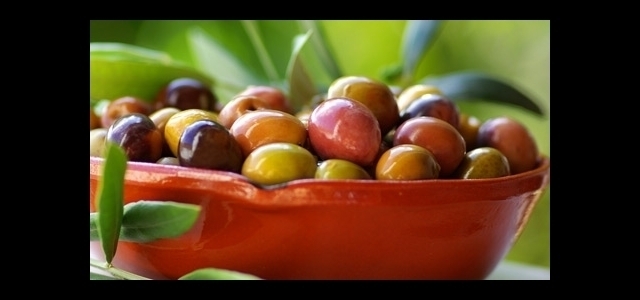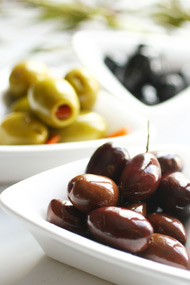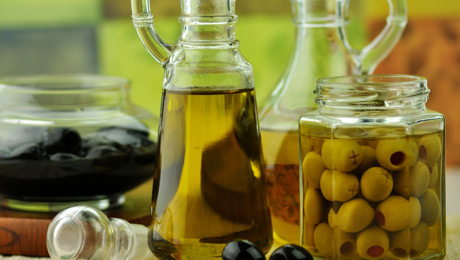
Ancient Greeks considered olives as a symbol of goodness and kindness, and today the olive branch symbolises peace. The tree has been cultivated for thousands of years, and many of its parts are useful - olives, olive oil, elegant wood and leaves.
It is grown in subtropical regions of the United States, Latin America and mainly the Mediterranean. The fruit of the olive is green and fleshy, and when ripe, it becomes purplish-black, with the exception of some varieties which, even when ripe,remain green or coppery. When ripe, the fruit is used for olive oil making.
From a health perspective, black olives are better than the green ones because they contain more inorganic salts.
Nutrition table
• Olives contain very few carbohydrates and are rich in unsaturated fatty acids.

• They have a high sodium content.
• They are a rich source of vitamin E, because they contain mixed tocopherols.
• Olives are rich in metals such as calcium, iron, magnesium, phosphorus, potassium, zinc, copper and selenium.
• Olive oil contains many unique phenolic and aromatic compounds, such as oleuropein and vitamin P. Other ingredients, in smaller quantities, include protein, vitamin C, vitamin K, phenylalanine, etc.
Nutritional value of olives
• Olives contain linolenic acid, which is very useful for infants. Its deficiency is associated with certain skin diseases and problems with development in infants. Mothers who are breastfeeding should include olives in their diet.
• Chlorine, which olives contain, can improve liver function.
• Vitamins A, D, E and K help bone development in children and adults
• The distinctive olive flavour comes from polyphenols. They have important anti-cancer and anti-inflammatory properties.
• Vitamin Ε and other antioxidants reduce the risk of cell destruction and inflammation.
Nutritional benefits of olive oil

• Besides being antioxidants, monounsaturated acids have a positive impact on cholesterol levels. Extra virgin olive oil reduces bad cholesterol and increases good cholesterol.
• Olive-acid, the main mono-unsaturated acid contained in olives, affects genes responsible for the development of breast cancer.
• Olive oil has anti-inflammatory properties, which have a positive impact on asthma and rheumatoid arthritis. Some of its ingredients give the same results as non-steroidal anti-inflammatory drugs.
• Magnesium and other elements reduce sharpness of flavour.
• Scientists have discovered that a natural compound in olive oil - oleocanthal, may be useful for the prevention and treatment of Alzheimer's disease.
• The American Diabetes Society and the European Council on Food Information suggest that diabetics should use olive oil, since monounsaturated fats can help reduce blood glucose levels.
• Studies show that black olives' nutrients are beneficial in combating osteoporosis and prevention of bone diseases.
• Olive and oleanolic acid help inhibit the growth and proliferation of cancer cells in the colon.
• Menopausal hot flashes can be reduced with the use of olive oil and olives.
• Olive oil contains a compound that reduces pain.
• Olive oil is good for the hair and helps restore damaged hair, also making it silky and shiny.
• Olive oil is useful for foot care, making the skin soft and strengthening toenails.
• Olive oil is added to many products for skin care because it improves elasticity.
The benefits of olive leaves

Leaves have many useful properties.
• Oleuropein is useful for lowering blood pressure and dilation of arterial blood vessels.
• They have anti-inflammatory properties.
• Olive leaf extract stops spreading of harmful bacteria and viruses.
• Leaves have antibiotic, antifungal and antibacterial properties. They are of use in treatment of colds and fever, as well as malaria.
• They are useful for the treatment of venereal diseases, herpes and gonorrhoea, as well as against tooth diseases.
• They have antioxidant properties that help fight free radicals, and blood vessel diseases.
Those who need to follow a diet low in sodium (especially people with hypertension) should be careful with olives, which have a high sodium content.






No comments:
Post a Comment